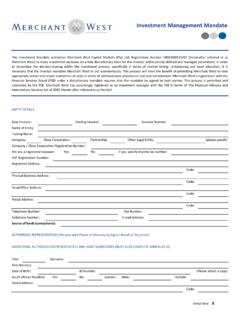Transcription of February 2012 Dividends Withholding Tax: Frequently asked ...
1 collective investments February 2012 Dividends Withholding Tax: Frequently asked questions 1. What is a dividend ? A dividend is the portion of a company s earnings that is paid out to shareholders in the form of cash or other assets (referred to as an in specie dividend ). A company is under no obligation to pay a dividend . 2. What is Dividends WithholdingTax (DWT)? DW T is a tax on Dividends received by a shareholder and is a Withholding tax. This means that the entity paying the dividend must subtract the tax from the dividend and withhold the tax before paying the net dividend to the shareholder.
2 3. When do I receive Dividends ? As an investor in our unit trusts, you are indirectly invested in the companies in which we hold shares. When a company pays out a dividend to us, we use it to cover the expenses of running the unit trust and pay the remaining balance to you either in the form of additional units or as a cash payout where applicable. 4. How are Dividends currently taxed? Companies listed on the Johannesburg Stock Exchange (JSE) are required to pay tax on Dividends in the form of Secondary Tax on Companies (STC) at a rate of 15%. 5. How will Dividends be taxed from 01 April 2012? Once DWT comes into effect, STC will be phased out and replaced with DWT.
3 This will result in the legal liability for tax on dividend distributions shifting from the company paying the dividend to the investor who owns the units in the unit trust fund. 6. What is the key difference between DWT and STC? DWT is a tax imposed on investors (at a rate of 15%) on receipt of Dividends , whereas STC is a tax imposed on companies (at a rate of 15%) on the declaration of Dividends . We are required to deduct this tax from your Dividends and pay the South African Revenue Services (SARS) on your behalf. 7. When must DWT be paid? DWT must be paid to SARS by the end of the month following the month of the declaration date (also the payable date) of the dividend by the collective investment Scheme.
4 This means that, if you receive a dividend on 15 April 2012, the entity Withholding the tax must pay the tax to SARS by no later than 31 May 2012. 8. Why is this new tax being introduced? DWT will be replacing STC. Companies will still be liable to pay STC on Dividends declared to shareholders until 31 March 2012. This will bring South Africa in line with the international tax of regimes of other countries that also implement DWT in order to encourage investment into our country. Page 2 of 5 collective investments | DWT Frequently asked questions | February 2012 STC created the impression that South Africa s corporate tax rate was higher than that of other foreign countries, making us a less attractive destination for investment.
5 Replacing STC with DWT aligns us with international standards where the recipient of the dividend is liable for the tax relating to the dividend and not the company declaring the dividend and non-resident investor may potentially be eligible for relief from double tax on his Dividends in terms of the Double Taxation Agreement if the dividend was also subject to tax in the foreign country. 9. What factors will determine the DWT rate at which I will be taxed? The rate at which we will deduct DWT depends on: whether your investment is held in the name of a natural person or legal entity, and your country of residence for tax purposes.
6 10. Who must pay Dividends tax? Certain shareholders are exempt from DWT. Essentially, natural persons (individuals) who are resident in South Africa, certain trusts and any foreign entity or foreign individuals are liable for DWT. The company or a regulated intermediary (or Withholding agent ) entity, such as a unit trust paying the dividend to the shareholder, is responsible for paying the tax to SARS. According to the new legislation, individuals (natural persons), certain trusts and foreign investors who are not tax resident in South Africa are liable for DWT. If the trust is a vesting trust and the beneficiaries have a right to the income from shares held by the trust, the beneficiaries and not the trust should be taxed.
7 In this instance the beneficiaries of the trust should provide the trust with a declaration of exemption if they are not taxable persons in terms of the DWT rules. Foreign investors may be eligible for reduced rates of DWT due to Double Tax Agreements (DTA) between South Africa and their country of residence. All other shareholders, excluding resident natural persons, are generally exempt and must follow the declaration procedure mentioned below in order to ensure that DWT is not withheld from the Dividends they receive. 11. Which shareholders are exempt from DWT? A company resident in South Africa (for income tax purposes this includes close corporations) Government Provincial administration Municipalities Public benefit organisations approved by the Commissioner in terms of section 30 (3) Closure rehabilitation trusts contemplated in section 37A Section 10(1)(cA) entities, which includes, amongst others, scientific, technical and research industries Section 10(1)(d)(i) and (ii)
8 Funds, which includes, amongst others o Pension funds o Pension preservation funds o Provident funds o Provident preservation funds o Retirement annuity funds o Benefit funds, such as a medical aid funds Section 10(1)(t) envisaged persons, which includes, amongst others o Council of Scientific and Industrial Research o South African Inventions Development Corporation o South African National Roads Agency o Armaments Development and Production Corporation of South Africa o Traditional Leadership and Government Framework o Regional electricity distributor o Water services provider o Development Bank of Southern Africa Page 3 of 5 collective investments | DWT Frequently asked questions | February 2012 12.
9 How do I prove I am exempt from DWT? All exempt shareholders must complete and submit the prescribed declaration form as soon as possible. The form may be found on the following websites: SARS Your collective investment scheme (unit trust) Your linked investment service provider (LISP) Linked Market Services or Computershare Failure to complete the declaration form before Dividends are paid to you will result in DWT being withheld at a rate of 15%. 13. Do foreign investors complete declaration forms? If foreign investors are entitled to a reduced rate of DWT, they should complete and submit the prescribed declaration form as soon as possible.
10 Failure to complete the declaration form before Dividends are paid will result in DWT being withheld at a rate of 15%. This rate may be reduced by DTAs between South Africa and your country of residence. Should the foreign investor not be entitled to a reduced DWT rate, no declaration form is required and the standard 15% rate will apply. 14. Who pays Dividends to shareholders? The company declaring the dividend , or a regulated intermediary (an authorised intermediate entity), pays Dividends to shareholders. 15. Are refunds of DWT overpaid possible? If DWT has been withheld from the dividend paid to you and you believe that the tax should not have been withheld, you must submit the declaration form as soon as possible.




